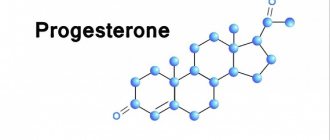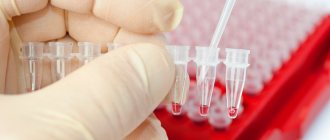Published: November 27, 2017 Updated: March 9, 2021
Hormonal imbalance can occur for a variety of reasons: due to stress, immune disorders, chronic diseases and viral infections, long-term use of hormonal medications, and even lack of sleep.
In what cases is it necessary to donate blood for laboratory tests? First of all - with an irregular menstrual cycle, heavy menstruation or pain during the cycle, as well as problems with conception. Deterioration of the skin condition - pimples, blackheads, decreased libido - are no less significant reasons to contact CITILAB for testing.
Thyroid-stimulating hormone
It has a stimulating effect on all stages of the biosynthesis of thyroid hormones, which increase the utilization of carbohydrates, increase the absorption of glucose by muscles, stimulate protein synthesis, increase the breakdown of fats and the oxidation of fatty acids.
Helps maintain normal weight and stay slim. Thyroid dysfunction leads to the development of symptoms that cause metabolic disorders, as well as reproductive function. 31-20-001 — TSH (thyroid-stimulating hormone)
Author:
Baktyshev Alexey Ilyich, General Practitioner (family doctor), Ultrasound Doctor, Chief Physician
Why do you need to examine hormone levels in women?
Hormone tests at different periods of a woman’s life make it possible not only to assess hormonal levels, but also to identify hormonal imbalances. Using the results obtained, it is often possible to diagnose problems in the body and eliminate them in a timely manner.
The doctor will suggest that the woman take hormone tests if any signs of pathology appear in order to eliminate it and normalize hormonal levels.
Hormone analysis is not the most reliable diagnostic method for a woman’s health; it is only an auxiliary technique for assessing the activity of many body systems.
A woman takes tests for sex hormones when there is a hormonal imbalance, which negatively affects the body and its functioning. Having identified a dishormonal condition, the doctor is able to timely diagnose the pathological condition and prescribe the correct treatment.
To obtain reliable results, it is important to take hormone tests correctly: blood is taken at a certain period of the menstrual cycle for each hormone.
A doctor may prescribe a blood test for hormones in different situations:
- for menstrual irregularities;
- with heavy or scanty periods;
- for pain during menstruation;
- for problems with conception and pregnancy;
- with poor condition of skin, hair and nails;
- with decreased libido;
- with increased hair growth;
- in case of violation of the child’s physical development;
- for acne;
- for tumors in the uterus and ovaries;
- for obesity;
- with a tendency to disease;
- with sexual infantilism.
Knowing the hormonal background in all these conditions, you can easily eliminate the problem if the disorders are diagnosed in a timely manner. Normalizing hormone levels by qualified specialists will help you quickly and easily cope with the problem.
Which hormone levels should be checked?
The main indicators that are checked when analyzing sex hormones include:
| Name | Bottom line | Upper limit |
| Estradiol | 43,8 | 211 |
| Progesterone | 5,3 | 86 |
| Testosterone | 0,45 | 3,75 |
| Prolactin | 67 | 726 |
| FSH | 1 | 11,8 |
| LH | 1 | 8,8 |
| Thyroxine | 9 | 22 |
| Triiodothyronine | 2,6 | 5,7 |
Prolactin
Normally, prolactin causes and maintains lactation - the production of milk by the mammary glands. In the postpartum period, it promotes the appearance of a milky substance from the mammary glands, which affects the child. The discharge stops on its own a few days after birth. By inhibiting the secretion of FSH, prolactin is responsible for the absence of ovulation in the postpartum period. In addition, by inhibiting the production of estrogen and progesterone, it prevents pregnancy with a new child while breastfeeding the previous one. It has been experimentally established that prolactin has an analgesic effect and also inhibits the action of dopamine, which is responsible for sexual arousal. It probably provides a refractory period. The hormone takes part in the formation of surfactant in the lungs of the fetus in the last stages of pregnancy.
FSH
Follicle-stimulating hormone stimulates the maturation of the dominant follicle and the development of the egg in it. In addition, FSH triggers the production of estradiol. The maximum concentration of FSH is observed in the middle of the menstrual cycle. It is at this moment that ovulation occurs - the release of a mature egg from the follicle into the abdominal cavity. Picked up by the villi, it moves into the fallopian tube, where conception occurs.
In the male body, FSH is responsible for the development and normal functioning of the testicles, enhances the maturation of male germ cells, and stimulates the production of testosterone.
LH
Secreted by the anterior lobe of the pituitary gland. Together with FSH, it regulates the functioning of the female reproductive system. The maximum concentration of the hormone is observed during the ovulatory period. Normally, it stimulates the ovaries; in men, it activates Leydig cells that produce testosterone.
Estradiol
It is the most active representative of the group of female sex hormones. It is he who is responsible for the development of primary and secondary sexual characteristics of the female type and influences the formation of the menstrual cycle. Stimulates the growth of the functional layer of the uterine mucosa, preparing it for implantation of a fertilized egg. Activates the production of transport proteins in blood plasma.
The level of the hormone depends on the phase of the cycle and correlates with the degree of maturation of the follicle - the closer ovulation is, the higher the concentration of estradiol.
Read more about blood tests for estradiol in women in this material - note. altravita-ivf.ru.
Progesterone
Read more about the analysis of progesterone and its norm in this material - note. altravita-ivf.ru.
The role of sex hormones in the female body
The content of the article
Puberty, the menstrual cycle, pregnancy, menopause or in general: health and beauty - all these processes and conditions depend on the specific level and constant fluctuations of female sex hormones. They are responsible not only for appearance, characteristic female features or reproductive abilities, but also for many other important processes occurring in the female body.
Hormones can either improve or worsen the condition of your skin and hair; positively and negatively influence overall well-being; increase or decrease libido and finally promote or hinder pregnancy and are responsible for various diseases.
For a woman's body to function effectively, it needs a stable hormonal balance. This is why it is so important to know the functions of individual female hormones, familiarize yourself with their standards, testing forms, and options for monitoring the correct concentration in the body.
Learn what names like estrogens, progesterone, androgens, and prolactin mean, and find out what these hormones do in the body.
Female sex hormones are the culprits of a long-term hormonal storm
You could say that hormones control your entire life. Although this is a simplification of the concept, it is no different from the truth. The endocrine system is complex and is responsible for a number of functions in the human body, and overall it directly influences hormonal balance. Therefore, the endocrine system is often tested first when symptoms, both physical and mental, are present.
Women who, both at puberty and throughout their adult lives, are constantly influenced by hormonal fluctuations can tell a lot about this. After all, female sex hormones are primarily to blame for emotional breakdowns, headaches and other unpleasant situations.
Hormonal fluctuations
When to see a doctor
Hormonal regulation is an extremely complex, subtle and multicomponent mechanism. All these biologically active substances connect different body systems with each other, affect not only their target cells, but also other organs and tissues, and also enhance or suppress each other’s effects. This is why, for example, when diagnosing reproductive problems in women, necessary to donate blood for thyroid hormone tests .
If a health problem is caused by a hormonal imbalance, then only a certified doctor can figure it out, find the “weak link” and correct the disorder with targeted influence. It has long been known that self-medication can be not only ineffective, but also downright dangerous. And in the case of endocrine diseases, this statement is true threefold - unprofessional intervention in the hormonal sphere can have catastrophic consequences for health.
Medical assistance from qualified SM-Clinic specialists is the best option for solving any hormonal problems. At the same time, you need to remember that the sooner you contact our clinic, the faster the correct diagnosis will be established. And early diagnosis is the most important factor in the success of treatment and minimizing the risk of complications.
What to do if your estrogen levels are too low or too high?
Both excess and deficiency of these essential hormones can have negative consequences.
Excess estrogen most often occurs in women who are obese, have diabetes, have hypertension, and have certain types of cancer, such as ovarian cancer. This is also associated with taking inadequate doses of estrogen-based drugs.
The effects of excess estrogen include:
- menstrual irregularities,
- headaches, seizures, including migraines,
- nausea and vomiting
- excessive growth of the endometrium, which can lead to cancerous changes,
- increased risk of blood clots and embolisms,
- swelling,
- breast enlargement,
- weight gain,
- general malaise,
- mood swings.
Estrogen deficiency is physiological in women during menopause, but pathological in women of reproductive age.
This may contribute to the following disorders:
- irregular menstrual cycles or their absence,
- infertility,
- disappearance of 2- and 3-row sexual characteristics,
- vaginal dryness,
- urinary tract infections,
- urinary incontinence,
- hot flashes and profuse sweating,
- sleep disorders,
- decreased sexual desire,
- mood instability and depression,
- loss of breast firmness,
- deterioration of the quality of the skin,
- calcium disorders and osteoporosis,
- heart disease as a result of high cholesterol.
When is a blood test for hormones prescribed?
Hormonal analysis is usually carried out if there is a suspicion of dysfunction of the endocrine glands or if an increase in the size of the glands is detected.
Indications for testing for female sex hormones (estrogens)
are:
- menstrual irregularities;
- infertility;
- miscarriage;
- acne;
- overweight;
- fibrocystic mastopathy (breast disease).
Indications for testing for male sex hormones (androgens)
are:
- suspicion of the development of tumor processes;
- ovarian dysfunction;
- kidney dysfunction;
- overweight (obesity);
- infertility;
- acne;
- in women – excessive growth of body hair.
Hormonal analysis is prescribed during pregnancy if pathological development of the fetus is suspected. An analysis for the hormone hCG (human chorionic gonadotropin), produced by the cells of the membrane of the embryo, can detect pregnancy already on the 6-10th day after fertilization.









